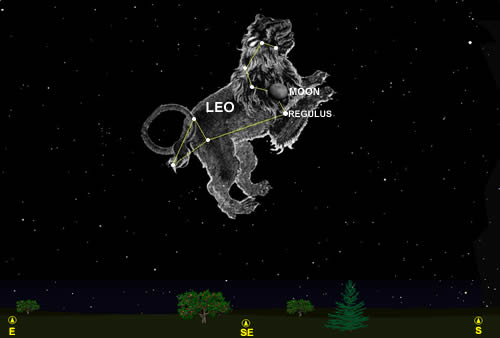We have a lot of lion stories on this blog! Choose a warm weekend night this spring to tell this one, but first, see if you can find and identify the constellation Leo. Sharing a story under the starry sky is magical, and because you do it in the dark, your child’s imagination is wide open. (We see Leo in the spring in the Northern Hemisphere: if you are in the Southern Hemisphere, you are of course looking for Leo in the autumn sky.)
Mighty Herakles (Hercules to the Romans) was made mad with rage by Hera, the wife of Zeus. In this fit of madness he murdered his wife and children. As punishment and penance, he was
assigned twelve labors, or enormous tasks, (giving us the word “Herculean” for a huge job). The first of these labors was to slay the dreaded Lion of Nemea.
Now, you must understand that Hera and Zeus often quarreled, and they chose favorites among mortals to champion and needled each other through those helpless surrogates. Because the people of Nemea had a shrine to Zeus, Hera had sent a monster to torment them: a lion that was said to be twice the size of normal lions, with a pelt impervious to arrows and blades. Herakles, too, was a favorite of Zeus, which was why Hera had afflicted him with murderous rage. (We have been discussing internal vs. external locus of control on this blog, recently, with explanation of how children learn to take responsibility for themselves, thus developing self-efficacy. I’ve also discussed it in the context of Ancient Greece with my reviews of Trojan War books for kids.)
When Herakles reached the woods of Nemea, where the monster had caused such devastation among the people, he quickly found the lion’s den. Discovering that it had two entrances, he blocked one up with a giant stone and then rushed in through the other entrance, wrestling the lion to the ground. The beast roared and struggled, but Herakles gripped it by the throat, strangling it to death. The hero then tried to skin it, but his knife was useless. It wasn’t until he used the lion’s own claw that he succeeded. Herakles ever after used the lion’s impenetrable skin as his own armor. And that was one labor done.
Hera honored the lion by placing him into the sky as the constellation Leo. In reflecting on this story, I think of the mighty Herakles with the lion’s pelt to protect him from physical harm, and it just seems ironic to me. He didn’t need that armor to protect him from the terrifying Nemean Lion, obviously! He had no shortage of physical courage or strength or prowess. What he needed protection from was the manipulation of his emotions and actions by the gods. If I look at the capricious Greek gods as metaphors for my strongest impulses, it seems to me that the armor, the protection, the courage I need is the courage to face my negative emotions (anger, jealousy, fear) without going mad; but more than that, that if I do let my negative emotions run away with me in a destructive way, I then face the consequences of my actions with self-reflection. Taking responsibility for my actions may mean more than performing twelve labors – what, after all, did Herakles get out of all those labors other than even bigger muscles? If we are to be something more than puppets to our emotions, then we must own our mistakes, sit with the knowledge of what we have done or failed to do. We cloak ourselves with the impenetrable armor of money, or technology, or social status to protect us from knowing we have done wrong, and from the necessity of changing our behavior next time.
As a parent, I have tried hard to show K. that “I wasn’t trying to, it was an accident,” is not really a sufficient reply when carelessness or anger cause harm. “The Devil made me do it,” or “It was the will of jealous Hera,” or “I was upset when I said that,” don’t absolve us of responsibility for our actions – whether accidental or deliberate. Neither does rushing off to make amends with some Herculean effort of atonement to show how very very very sorry we are. If nothing is learned, the results will be no different next time and the potential for damage just as great. Carrying around proof of my atonement may only be a way to deflect further punishment and avoid responsibility and maintain an external locus of control.
I’ll try to find Leo in the sky tonight, and point it out to K. while we talk about Herakles and the Nemean Lion. Maybe I’ll ask her what she thinks. Maybe I’ll tell her what I think. Maybe we’ll just look at the stars.
You might want to read: our 5-Minute Courage Workout on Saying I’m Sorry, as well as our long post describing what is emotional courage.
photograph from Starrynighteducation.com

